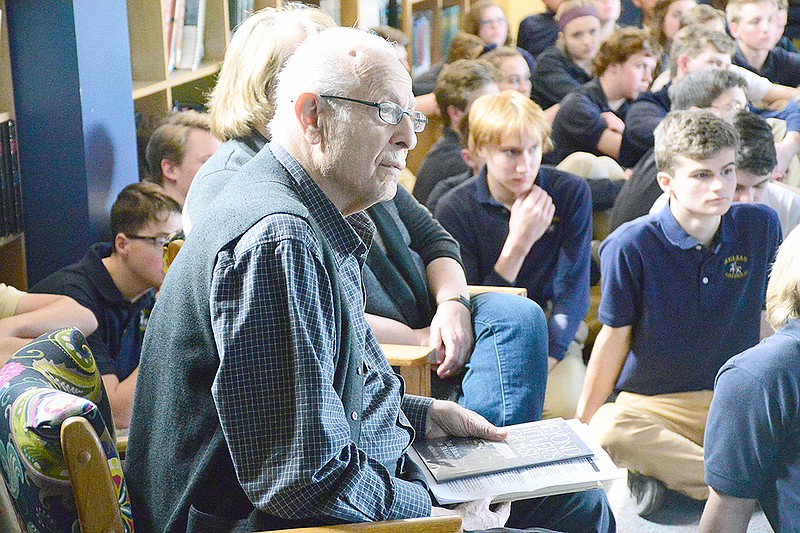Not every person's experience in the Holocaust ends in a Nazi death camp, but that doesn't make other survivors any less cognizant of what could have been taken from them and what future generations could lose if they don't heed the lessons of the past.
"We were very lucky; but at the same time, I continue to be haunted," Ram Levy, born in 1933, told a library full of Helias High School sophomores Thursday.
Levy's family were Bulgarian Jews. His family escaped the worst of the cruelty of the Nazis and their allies because of Bulgarian people who led the Balkan nation in disobeying Nazi directives and saved many of the country's Jews from deportation and almost certain death.
That doesn't mean Levy is any less affected by what happened to Jews and other people who were shipped from all across Europe to concentration and death camps.
"I know that we came close to real danger," he said.
This is the fifth year Helias sophomores have read Elie Wiesel's "Night" in their English unit on the Holocaust. "Night" is the memoir of the late Romanian-born Jewish writer, philanthropist and Holocaust survivor who chronicled his experiences at the Auschwitz-Birkenau death camp.
Helias English teacher Sarah Kempker first invited Ben Fainer to speak to students in 2013. Fainer survived camps including Auschwitz, Dachau and Buchenwald. He visited Helias twice, but when he died, survivor Jerry Koenig spoke at Helias last year and the year before.
Kempker introduced Levy this year with a video interview with Fainer in which he spoke about his horrific experiences - the full extent of which he admitted probably were beyond even the grisly images he conveyed.
Levy said Bulgarian Jews - of which there were about 50,000 at the time - had it better by comparison. The community had allies in the Bulgarian Orthodox Church, and he said the church voiced opposition as restrictions were imposed upon Jews' civil rights after Bulgaria aligned itself with Nazi Germany.
Those restrictions and the ultimate expectation that all Jews be deported from Bulgaria to concentration camps were included in the demands the Nazis listed for the country in exchange for promises to help Bulgaria reclaim territory it had lost in World War I.
The Orthodox Church's allyship with Bulgaria's Jewish people was one of a few things the community had in its favor, however - unlike most every other group of Jews in Europe.
Levy said Bulgaria's Jewish community lived integrated into society. Anti-Semitism wasn't as strong there. "People knew us," he said. The police in his small town of 15,000-17,000 people didn't enforce the curfew imposed on Jews, he said.
While the 600-700 Jews like him in his town were forced into what was essentially a ghetto, he added, access was unrestricted enough to where they could venture outside of it - albeit that physical assault from waiting bullies was a possibility.
People eventually discovered in March 1943 the plans to deport Bulgaria's Jews and shared the secret with the community. Jews reached out to leaders in the church and the country's government, and by May 1943 king Tsar Boris III was persuaded to cancel deportations.
"He ultimately deserves the greatest credit for giving this final order," Levy said.
The military forces of the Soviet Union encroached on the country as the Nazis were beaten back to Berlin, and Bulgaria aligned itself with the USSR and declared war on Germany in October 1944, according to the United States Holocaust Memorial Museum.
The ultimate refusal to cooperate with the Nazis' plans for the Jewish people ultimately caused Bulgaria's Jewish population to grow by the end of the war, Levy said - as opposed to being decimated just about everywhere else.
He told students they must always watch for injustice being perpetrated and be brave enough to speak against it. "That is the one message I have to give you," he said.
His family didn't escape the Holocaust without any losses, though. His father was forced to work in a labor camp for all but three months of each year for three years; with him as the family's provider, they had to rely on relatives to get through poverty and food shortages.
His father contracted malaria after being forced to work on building a road through a swampy area, and he never fully recovered his physical strength.
The family ultimately emigrated to Israel in 1949. Ram studied Hebrew and worked on the farm at a kibbutz for a year; served for a couple years in the Israeli Army; studied chemistry in the Army, in Israel and in Canada; and ultimately had a career working for McDonnell-Douglas Research Laboratories in St. Louis.

